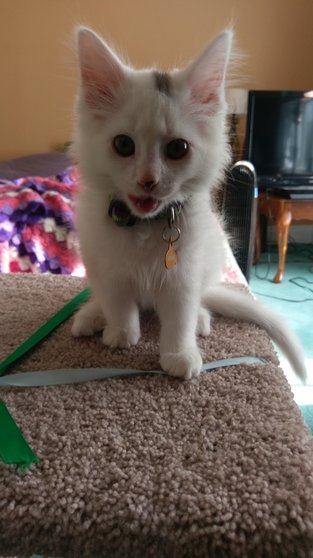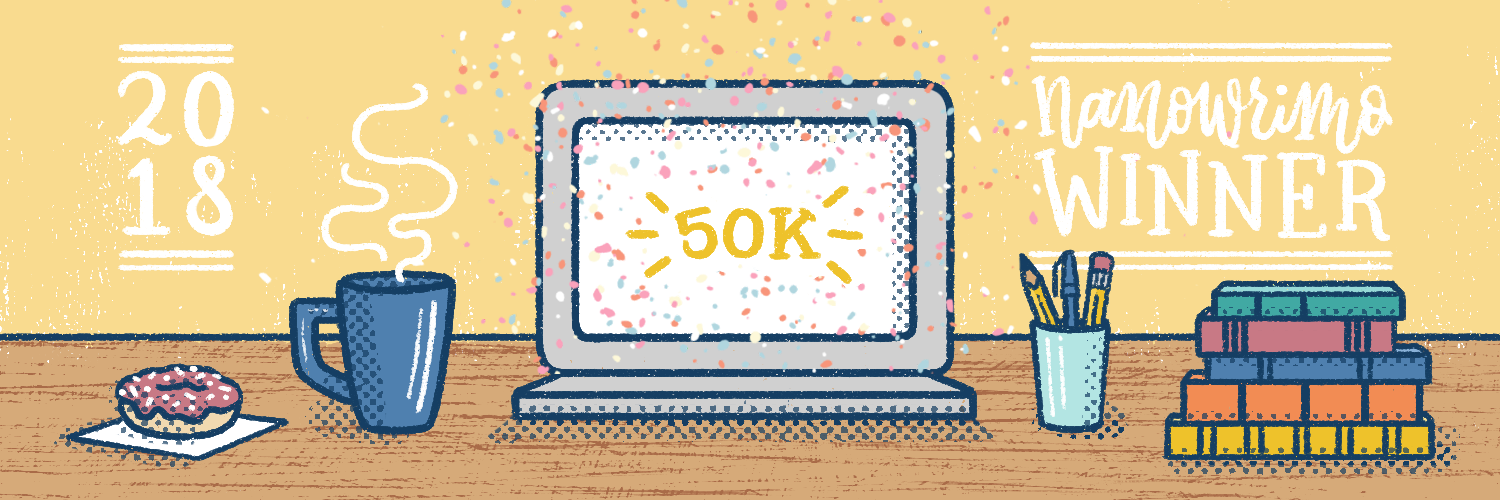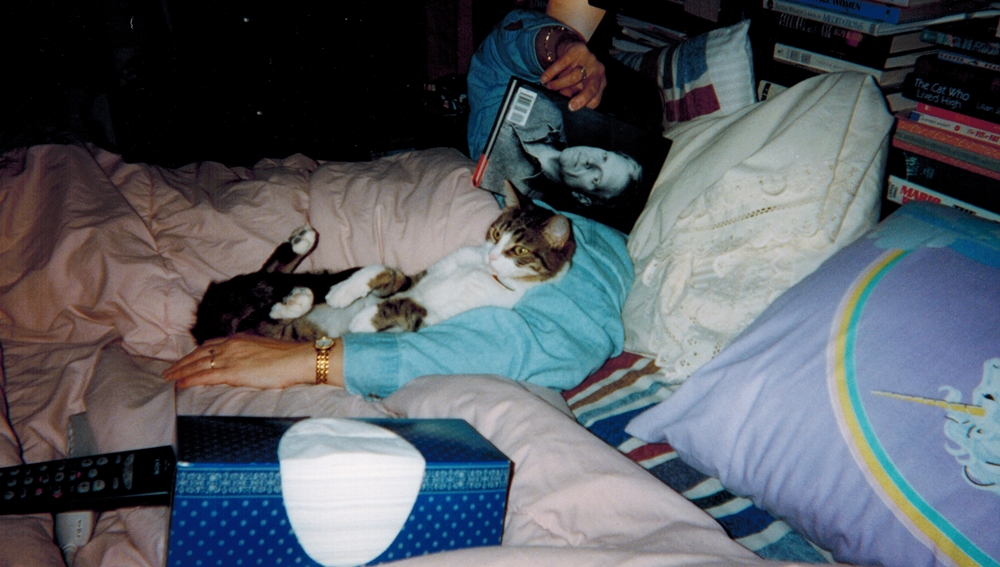|
I've done NaNo for nine years now and have that many finished novel first drafts. That being said it's been extremely hard to take these drafts and turn them into final drafts.
For a long time I thought that it was because I had no idea how to edit, or because I was simply inexperienced with editing and therefore couldn't do it quickly or for a piece this big. But after doing NaNo 2018 where I had a completely outline and character studies for my two main characters and sketches of the main rooms that the story took place in, well it flew. The whole writing process was smoother and overall more enjoyable. Furthermore the editing felt like a breeze and was actually enjoyable, because I could see how to take what I had and make it into what I wanted. I didn't do a proper after action plan analysis of that though. I didn't think, "Oh I should make sure to have a fully fleshed out story before NaNo." I often fluctuate between pantser and plotter and that year just happened to be a plotting year, no worries. But then 2019 rolled around with my mild outline, no character studies, and no location sketches. I wrote hard for the first week, getting at least 2k every day knowing to keep the momentum up. Then I hit the wall, hard. While that wall is often a part of week two blues it was also majorly influence by the fact that my outline said, "write 10k about a journey through a fantasy setting until she finds the magic eaters." What was I supposed to do with that, past self!? Eventually I talked it out with many writer friends and my SO, and I realized what I wanted to do with that section. But it's going to take a lot of work to thread that into the sections I already wrote. That all being said, my new approach is my 2018 approach. I'm going to have a full outline for NaNo 2020 with an index card for each scene. I'll be writing it for Camp April this year, in less than a week! It's exciting to have a new creative project to work on and that this outline will help make my future writing and editing endeavors that much more fun!
1 Comment
If you're going to be the best in your craft then you have to keep on top of the newest information. If you're a doctor you have to do continuing education classes every year in order to keep your license.
Should everyone else do the same when they aren't required to? Yes, absolutely! One never knows when a new software might make life that much easier or when a new way of creating magic systems comes out that is eons better for you and your writing style. Not only that learning about a new way to help get good feedback from a beta reader or write up instructions for doing a task might not work for you, but will be a perfect fit for a friend who needs advice down the road. Having a variety of ways to approach the same problem is helpful because you never know which one will be the best fit for the job. Let's say you need to replace the batteries on a toy. The battery holder is held there by a + screw. You always use a - screwdriver because that's what you can easily find in your house, and it will totally work. It won't be as easy and it might strip the screw, but you will get those batteries replaced and hand the toy back to the child. The process would be easier with a + screwdriver. Even though you might say 'I already have a screwdriver' and avoid having to get and learn how to use something new, it could save tons of time and effort in the future. Just like learning about a new screwdriver that's a better tool for certain situations, learning new ways to perform your craft is absolutely something that everyone should do. If you're ambitious then trying out one new thing a month would be great way to expand, though one every three months could work too. It depends on you and your speed of learning, and how much time you have to dedicate to your craft in the first place. What will you be learning next?  I present to you Eight Sentence Sunday, a blog hop hosted by Weekend Writing Warriors. I finished National Novel Writing Month in November, so you'll be seeing parts from that for the next couple of months as I expand and edit the rough draft. A while later she was on the other side of town, knocking on Lorenzo Baldocinetti's door. The sign above the door said "Inventor." Pages from the local printing press were plastered on the window for all to see and read. Only one new one since last week, and it just looked like an ad for hiring new experts to help on the latest invention.
"Looks like an alchemist, circus performer, young man to work hard, and a smart child." Sounded like a riddle. Must be something Lorenzo put together himself. The door opened and the hunched man smiled. "I was hoping you'd show up today."  1) Finish MM – Still behind. This is my MAJOR focus this month! I’ve planned some write-ins and accountability times with friends and it’s already helped make slow, yet steady, progress. (I think that might be my mantra for the year. “Slow and steady progress is perfectly fine.”) 2) NNWM Plotting – I’ve been doing online research. I have a couple more books that I should read soon. Ideally I’ll be doubling down on this once the first draft of MM is done. 3) Short Stories – Been a bit distracted. I’ll be back at it this month! 4) Critique Group – I’m caught up, though people haven’t been submitting often. I think we’ll need a discussion about everyone’s vested interest levels again soon. Until then I have a friends novel that’s ready for a full beta read, so I’m working on that currently. (In turn she said that she would be happy to beta read MM when it’s ready. A worthwhile trade.) 5) Author Visibility – Totally dropped the ball on this. Gotta post more cat photos! How are your goals going? I present to you Eight Sentence Sunday, a blog hop hosted by Weekend Writing Warriors. I have some lines from my Moon Murder rewrite. The first scene is available as an audio sample on my sample chapters page if you want to give it a listen! 16 used her left hand to shield her eyes from the light above. “What is that? Its like a real sun.” She put her arm into a patch of light shining through the large leaves onto the stone path. “It’s warm like the sun too.” “It’s just like the rainforests your dad helped preserve…” Zheng touched one of the ferns, leaning into the walking area. “It’s real.” She continued to hold it, staring, as if she could barely believe in its existence. Check out more at http://www.wewriwa.com/.
I present to you Eight Sentence Sunday, a blog hop hosted by Weekend Writing Warriors. I have some lines from my Moon Murder rewrite. The first scene is available as an audio sample on my sample chapters page if you want to give it a listen! Zheng's first step sucked the heat out of her bones. This is the place that her daughter had been for the last three years, and this was the place where she was missing. Yet with this feeling of foreboding filling her soul, the area seemed so full of life. People took their luggage and rushed to their final destination. Some went to the undocking platform below to pick up large deliveries. While families welcomed back their loved ones with hugs and kisses. The thing that should be happening between her and 22 right now. She bit her lip to stop herself from crying, it wouldn't help. Investigation, observation, questioning, those are what would save her daughter-if there was a chance for her to be saved. She took a deep breath, steeling herself, then took the next step into the dome, following the others. Check out more at http://www.wewriwa.com/.
I present to you Eight Sentence Sunday, a blog hop hosted by Weekend Writing Warriors. I have some lines from my Moon Murder rewrite. The first scene is available as an audio sample on my sample chapters page if you want to give it a listen! Zheng counted the handful of guards at the outskirts of the room. Seven, plus a butler at the table to the right of the throne. The wall behind him was taken over by a well stocked bar manned by a bartender who was meticulously washing glasses. The front wall was made of three large windows, while the left was covered in screens with ever changing statistics for betting in each arena. A brood man Zheng guessed was Mason laughed as the two fighters in the pit looked for an opening. "This is when it starts to get interesting." The butler announced their presence. "Sir, the representative from the research colony is here to talk about the food." Mason waved his hand in dismissal. "Tell him to wait." Check out more at http://www.wewriwa.com/.
 In honor of my upcoming trip to NYC; a picture of Central Park during my last visit! In honor of my upcoming trip to NYC; a picture of Central Park during my last visit! For National Novel Writing Month I've decided to rewrite an old novel instead of editing or writing something new. I had to think about this decision for months and I thought talking about it might help other writers come to a quicker decision. The biggest reason was my growth as a writer. I originally wrote this book two years ago as when I had just started to look at writing seriously. Since then I have written half a million new words, taken classes, read new books, and had new experiences. These have noticeably changed my writing style. It would take just as long, if not longer, to edit this novel than to rewrite it at the quality I can naturally achieve at this point in my career. The second reason was my decision to change the book from first person to third person. This is turn would have made editing take a long time with too much focus on language and not enough focus on character development. Third was my decision to add my villain, or at least paperwork related to my villain, into the book. Adding these files while editing or rewriting doesn't change the amount of time it'll take. They will change how much the reader understands about the story and, I'm hoping, drastically ramp up the tension. This means a change to the pacing, which is always a hard thing for a writer to pin point, and I think a rewrite is the best way to try to get this done properly. Lastly were a couple of specific details that related to me pantsing this novel. I wrote in in first person, out of order, while barely knowing my characters. A radical rewrite will allow me to write in third person, in order, with proper character arcs, while leaving better clues. Have you made the decision to rewrite instead of edit? If so what were your motivations? With only one new submission from my critique group I was able to focus on finishing the full novel critique for a friend. I took some time, and 3k words, to talk about ways to improve the story. Many of these suggestions can be applied to any novel, so I thought I would share them with the rest of the world in a three post series about editing. Without further ado: Editing Resources. Not all writing tools work for all writers. The ones I list are ones were particularly applicable to the book I critiqued. If they don't work for you feel free to throw them out the window. Pyramid of Abstraction - More details make a piece feel more professional. This tool looks into why. The more grounded the reader is in a scene the more crazy shit the author can talk about without losing the reader. More specific details, particularly dealing with the senses, will help ground the reader. This is from Sanderson’s seventh class. (Which is the best in the series so far.) Definitely worth a listen. Cutting 10% - In the realm of editing it is said that cutting 10% will help streamline a story. This isn’t supposed to be a generic guideline or goal – it's a learning process. The hope is that a writer will learn the economy of words, making sure each one adds detail, character development, action, or plot. Once an author understands the economy cutting 10% usually isn’t needed or wanted. (That being said, one of my favorite books ever, “The Mote in God’s Eye,” was the result of a request by the publisher to cut 10% even though both authors were well established.) Sanderson’s Laws of Magic – There are three laws, the first one is usually the most relevant. “An author’s ability to solve conflict with magic is directly proportional to how well the reader understands said magic.” Powers needed to be expanded upon is because the novel does use magic to solve problems. If the reader doesn’t understand the magic, and the limits of that magic, then they can’t really get used to it. There is a video or text to learn more about this law. The best example of this is LoTF. Gandalf seems all mighty and powerful, yet he cannot take the ring to Mordor himself. BUT because the magic system is completely undefined the readers don’t question it. On the other hand there’s the ring, which has the clearly defined power of turning the MC invisible. This is used plenty of times throughout the book and when it’s used to the MCs advantage the readers love it. Motivation/Reaction Units (MRU) – For easier reading a motivation should come before the reaction. The door needs to creak before a character has a reason to look at the door. Realizing that the photos don’t look like the apartment has to happen first, the reaction is a feeling of regret. This was from the book “Rivet Your Readers with Deep Point of View”, I’m not sure you’d get anything else useful out it, the rest of their suggestions don’t really suit your writing style.  Spring Break 2010. Florida sunrise. Spring Break 2010. Florida sunrise. With only one new submission from my critique group I was able to focus on finishing the full novel critique for a friend. I took some time, and 3k words, to talk about ways to improve the story. Many of these suggestions can be applied to any novel, so I thought I would share them with the rest of the world in a three post series about editing. Without further ado: Editing Prose. This is all stuff that should be done AFTER doing plot arc and scene related work. (Feel free to not even read this until those are done. For real.) 1) Find/delete –Uses of ‘finally’. Using ‘finally’ continues to delay, for the reader, what’s getting waited for. It’s better to get on with it. 2) Find/delete –Uses of ‘obviously’. If it’s really obvious then the reader already knows it, and if it’s not obvious then it’s better to use details to make it obvious. 3) Find/delete – Uses of ‘I think/thought’. If it’s in dialogue then no problem, but if we're far into a characters point of view it shouldn't be needed. If a search of your book comes up with a lot of these phrases then there is another option; italicizing all internal thoughts. This alternative allows you to get rid of all uses of 'I think/thought' without radical rewrites of the thought contents. . 4) Find/delete – Uses of ‘very’ and ‘really’. They don’t add. There’s an economy of words, and these are on the low end. They can be deleted outright without loss, or replaced with a more useful word. “Really bad” = “Terrible” “Very big” = “Huge” 5) Replace – ‘thing’. The more details the better, look at the resource ‘Pyramid of Abstraction’ for a more complete explanation as to why. (To be talked in a future blog post.) Be careful about repetition. The reader doesn’t want to read about the same experience twice or rehashed phrases. It doesn't hurt to try cutting 10% for any piece, no matter how experienced the author. This is a tool, not a goal, I'll expand upon it in my next post about editing resources and tools. |
Project Progress
100 Squats per Day
21%
Read 52 Books
100%
|



 RSS Feed
RSS Feed